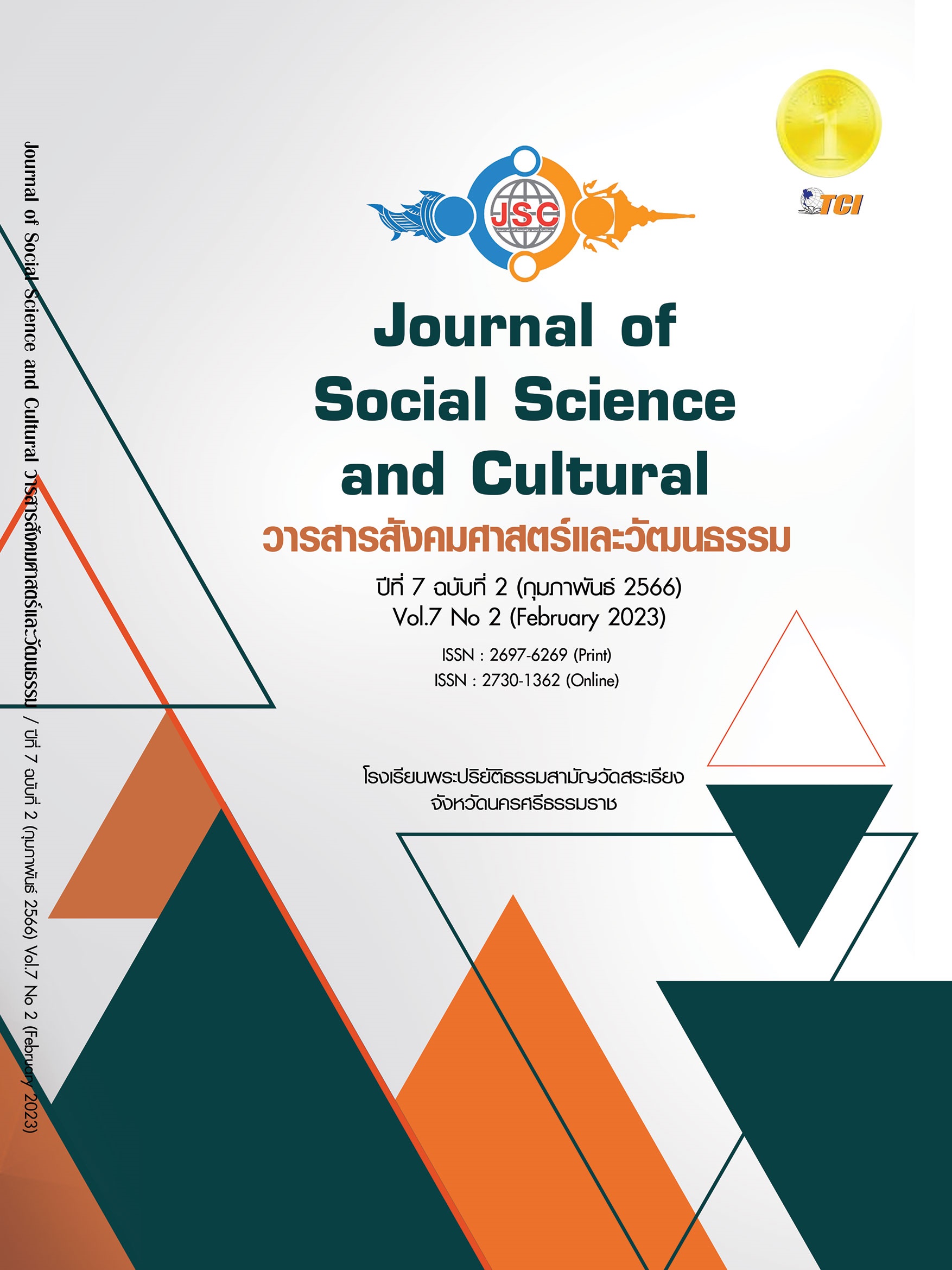THE STUDY OF HUMAN RESOURCE CAPACITY IN ENHANCING SECURITY AND PROMOTING HYBRID TOURISM EXPERIENCES IN CONTROLLED AREA FOR NEW NORMAL WAY AFTER COVID-19: A CASE OF WING 5 ROYAL THAI AIR FORCE
Main Article Content
Abstract
In this study, the Wing 5 Airforce was studied as tourism in controlled areas, the studies of tourism in military areas in Thailand are rare and not yet widespread. This research project will help to further develop body of knowledge about the development of tourism in the military area. The goal is to promote tourism by emphasizing on hybrid tourism model. The objective of this research was to study the direction in developing human resource capacity for enhancing safety and promoting hybrid tourism experiences in controlled area for new normal way after Covid-19. Demographic scope and sample was a member of tourism network within the organization, Wing 5: 1) Five executives of Wing 5 area and 2) Twenty-five operational level personnel involved in tourism management in Wing 5.The research methodology was a qualitative research which consisted of 1) in-depth interview and 2) conducting focus group. Data analysis was content analysis. The important findings from the research were:1) the development of knowledge management networks for enhancing safety and promoting hybrid tourism experiences in controlled area should be the integration of relevant personnel in Wing 5 area for tourism management, 2) the important competencies for development of knowledge management networks for personnel to enhance safety and tourism experiences were safety management, tourism management and service and public mind, 3) the guidelines for enhancing safety and promoting hybrid tourism experiences in controlled area were totally 12 important guidelines.
Article Details
References
กระทรวงการท่องเที่ยวและกีฬา. (2560). แผนพัฒนาการท่องเที่ยวแห่งชาติฉบับที่ 2 (พ.ศ.2560-2564). กรุงเทพมหานคร: สำนักงานกิจการโรงพิมพ์องค์การสงเคราะห์ทหารผ่านศึก.
ชูชัย สมิทธิไกร. (2556). การฝึกอบรมบุคลากรในองค์การ. กรุงเทพมหานคร: สำนักพิมพ์แห่งจุฬาลงกรณ์มหาวิทยาลัย.
ทัชชกร แสงทองดี. (2561). คุณลักษณะภาวะผู้นำเชิงพุทธ. วารสารวิจัยวิชาการ, 1(3), 137-149.
ธนบูรณ์กิตติ์ จิรพัฒนากร. (2552). สมรรถนะการบริหารของผู้บริหารระดับกลางของอุตสาหกรรมการโรงแรมในภาคใต้ของประเทศไทย. ใน ดุษฎีนิพนธ์ปรัชญาดุษฎีบัณฑิต สาขาวิชารัฐประศาสนศาสตร์ . มหาวิทยาลัยรามคำแหง.
บุญสืบ เทียมหยิน. (2553). ปัจจัยที่ส่งผลต่อสมรรถนะการบริหารงานบุคคลของผู้บริหารสถานศึกษาในสถานศึกษาที่เปิดสอนระดับมัธยมศึกษา สํานักงานเขตพื้นที่การศึกษากรุงเทพมหานคร เขต 2. ใน ปริญญาการศึกษามหาบัณฑิต สาขาวิชาการบริหารการศึกษา. มหาวิทยาลัยศรีนครินทรวิโรฒ.
ปัณฑารีย์ สีสะอาด. (2564). ความสัมพันธ์ระหว่างทัศนคติและพฤติกรรมต่อมาตรการความปลอดภัยในการ เดินทางท่องเที่ยวทางน้ำของพนักงานประจำเรือ กรณีศึกษาการเดินเรือเส้นทาง พัทยา - เกาะล้าน. วารสารวิจัยวิชาการ, 4(4), 133-142.
พิสมัย พวงคำ. (2551). สมรรถนะของบุคลากรสนับสนุนวิชาการ มหาวิทยาลัยขอนแก่น. ใน ดุษฎีนิพนธ์ศิลปศาสตรมหาบัณฑิต สาขาวิชาการบริหารการพัฒนา . มหาวิทยาลัยขอนแก่น.
สุกัญญา รัศมีธรรมโชติ. (2551). การบริหารมนุษย์ให้สุดยอด. กรุงเทพมหานคร: แผนกประมวลความรู้ฝ่ายวิจัยสถาบันเพิ่มผลผลิตแห่งชาติ.
อนันต์ พันนึก . (2554). การวิจัยและพัฒนาโปรแกรมพัฒนาสมรรถนะผู้บริหารสถานศึกษาขั้นพื้นฐาน. ใน ดุษฎีนิพนธ์ศึกษาศาสตรดุษฎีบัณฑิต สาขาวิชาการบริหารการศึกษา. มหาวิทยาลัยขอนแก่น.
อนุราช วิมล. (2555). การมีส่วนร่วมในการป้องกันอุบัติภัยทางน้ำของคนประจำเรือโดยสารอำเภอเกาะสมุย จังหวัดสุราษฎร์ธานี. ใน ดุษฎีนิพนธ์รัฐประศาสนศาสตรมหาบัณฑิตสาขาวิชารัฐประศาสนศาสตร์. มหาวิทยาลัยราชภัฏสุราษฎร์ธานี.
อรัญญา สมแก้ว. (2548). Competency Management : การนำ Competency สู่การปฏิบัติ. เรียกใช้เมื่อ 3 กุมภาพันธ์ 2564 จาก www.siamhrm.com
Amir, A. F. et al. (2015). Sustainable tourist environment: perception of international women travelers on safety and security in Kuala Lumpur. Procedia - Social and Behavioral Sciences, 168(2015), 123 - 133.
Ashton, A. S. & Chootiraka, M. (2016). Mitigating destination risk perception: studyon international retirement migration tourists in Thailand. CAUTHE 2016: The changing Landscape of Tourism and Hospitality: The Impact of Emerging Markets and Emerging Destinations. Sydney: Blue Mountains International Hotel Management School.
Boyatzis, R.E. (1999). Clustering Competence in Emotional Intelligence : Insights from the Emotional Competence inventory (ECI). Retrieved December 10, 2020, from www.ei.haygroup.com/resources/Library_articles
Zwell, M. (2000). Creating a Culture of Competence. New york: Johm Wiley and Sons, Inc.


